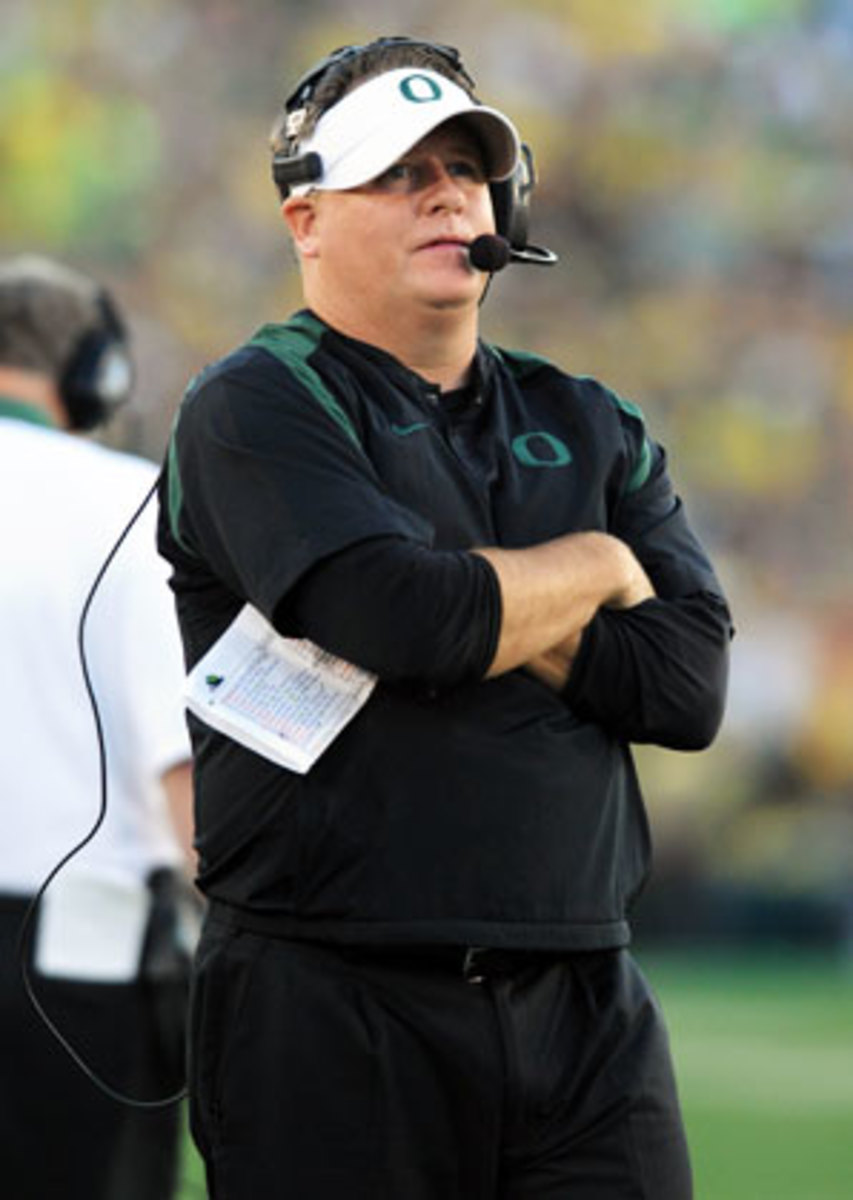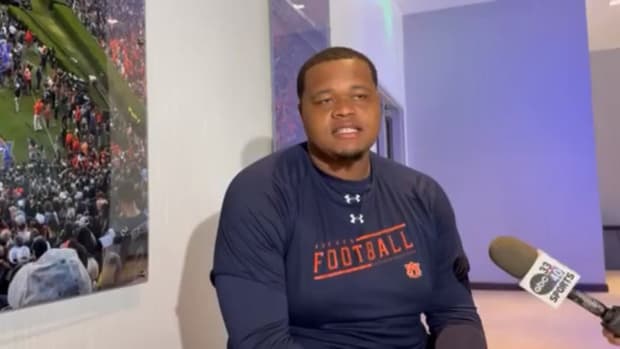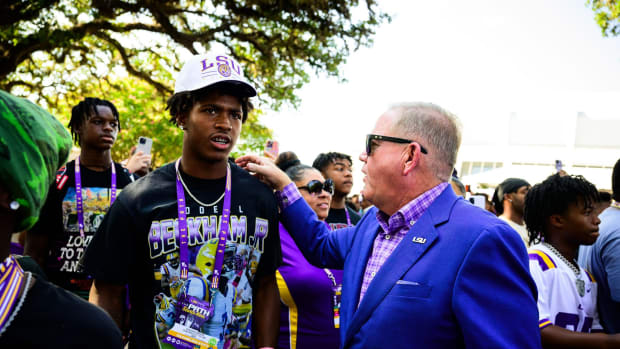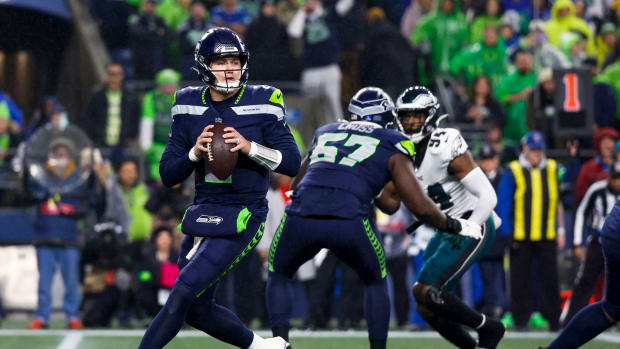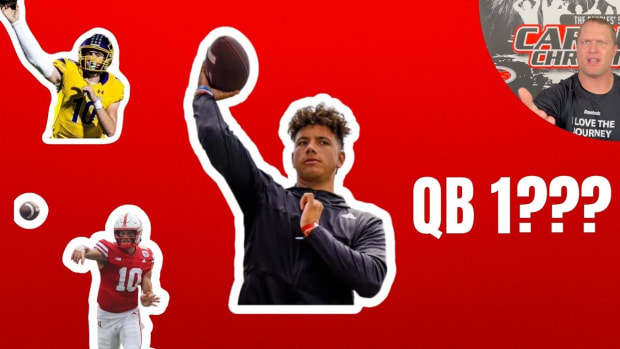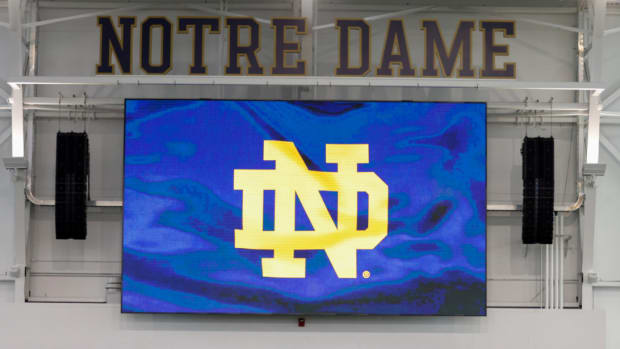Sizing up Chip Kelly's next move, the BCS title game; more mail
I'm in the midst of a travel-heavy week, which started by covering Tuesday's Rose Bowl, continued with a short flight to Arizona for Thursday night's Fiesta Bowl and will end in Miami for the BCS title game. But apparently I've got nothing on one of the Fiesta Bowl coaches, Chip Kelly, who according to reports will spend the next day(s) interviewing with the Cleveland Browns, Philadelphia Eagles, Buffalo Bills and possibly others. (I assume he'll use "Logistics" to keep all of it straight.)
Suffice it to say, I have a feeling I'll be covering Kelly's last game as the head coach of Oregon on Thursday night.
So with the NFL regular season over and the Eagles looking for a coach, I would love to know your take on Chip Kelly potentially leaving Oregon and heading to the NFL. Granted, the Ducks have the NCAA investigation going on, but is it really a good move for Kelly to leave Oregonfor a beleaguered NFL team?-- Jim Felton, Somers Point, N.J.
Chip Kelly is a great college coach, but what do you think will happen if he goes to the NFL? I just don't see him having any success there (a la Steve Spurrier). Some coaches are just better suited for the college game, and he seems like one of them.-- Adam, Kalamazoo, Mich.
Only Kelly can say whether heading to the NFL is a good move. On one hand, it sure seems like a more comfortable existence to stay at Oregon forever and keep going to BCS games every year. On the other, the NCAA could soon make his job more difficult, and perhaps even punish him personally. It's also unrealistic to think that the Ducks will maintain this current run forever. Eventually there's a bumpy year or two, and eventually the fans tire of you, as hard as that seems to imagine right now. And if things don't work out in the NFL, another major college program will hire him in a heartbeat down the road.
As for whether he'll succeed in the NFL, much will depend on whether the franchise that picks him (and vice versa) drafts good players and signs quality free agents. That's certainly played a major role in Jim Harbaugh and Pete Carroll's recent successes. Given the right situation, however, I think Kelly would not only succeed, but in fact help revolutionize the NFL.
NFL teams are already trying to emulate many elements of college offenses. The Patriots are running the hurry-up. The Redskins, Seahawks and others are incorporating the zone-read with mobile quarterbacks. Kelly knows more about all of those schemes than anyone currently coaching in the NFL, and unlike typically conservative NFL lifers, Kelly may be the long-awaited outsider who will fully commit to a hurry-up spread system. It's long been inevitable that such a day will come, and when it does, I don't think NFL defenses will be remotely prepared for it.
The misperception about Kelly's and other spread offenses is that the quarterback runs too much, thus exposing him to injury. With this year's Ducks, however, the threat of Marcus Mariota running the ball far overshadowed the instances in which he actually ran. Mariota had 98 carries in 12 games, or 8.2 per game. To put that in perspective, Robert Griffin III ran 120 times in 15 games for the Redskins this season, an average of 8.0 per game. And Kelly is smart. He wouldn't run the exact same system he does at Oregon. He would adapt to his personnel. I wouldn't be surprised if his NFL offense looked a lot like Stanford's did down the stretch with Kevin Hogan -- a mix of shotgun zone and I-formation power -- only at an even faster pace.
Look at it this way: NFL teams fired seven coaches last Monday. Other than long-tenured guys Andy Reid and Lovie Smith, all were either retreads who failed at a previous job or career NFL coordinators who did nothing particularly unique. There's a reason NFL coaching hires tend to be stale like that. The pool in a given year generally consists of head coaches fired by a previous team or coordinators from playoff teams. This year, that field consists of 31 individuals. That's a pretty limited pool. If I had a choice between hiring a retread, cookie-cutter coordinator or a potential game-changer like Kelly, I'm going with Kelly. But first the guy has a Fiesta Bowl to coach.
Louisville wins over Florida. Northwestern beats Mississippi State. South Carolina needs a last-minute score to beat Michigan. After three quarters, Georgia is tied with the same Nebraska team that got demolished in the Big Ten title game. Is it possible that the SEC isn't as far ahead of everybody else as we have been told all season? Or perhaps is the Big Ten not quite as bad as we have been led to believe?-- Jonathan Jaworski, Elkhorn, Neb.
I'm generally not one to make generalizations about conferences based on individual bowl games. All the kudos in the world to Louisville, but the Cardinals played better on Jan. 2 than they did at nearly any point from Sept. 1 to Dec. 1, and Florida's defense played far worse than at any point during the same span. The Sugar Bowl was certainly a feather in the cap for the Big East (and soon-to-be-ACC) and a regrettable moment for the SEC, but two teams played at the Superdome on Wednesday night, not two conferences. As for the SEC-Big Ten games, the only true surprise to me came when Michigan nearly beat South Carolina. The Wolverines clearly improved as the season progressed, and they had a month to more fully integrate Devin Gardner at quarterback and Denard Robinson at running back. But we always knew Mississippi State was the ultimate SEC echo chamber team back when it nearly cracked the top 10.
STAPLES: Louisville continues climb by beating Florida in Sugar Bowl
Having said that, I'd just like to congratulate the Gators on proving to be bafflingly unpredictable for an entire season. They were a thorn in my side right to the very end. As you may recall, I refused to buy into Florida for most of the season due to its anemic passing game, and I took some serious flack from the Gator faithful because of it. After Will Muschamp's team lost to Georgia and almost to Louisiana-Lafayette, I thought I could safely pick Florida State to beat Florida; of course, the Gators' offense picked that day to magically awaken. And right on cue, after picking Florida to dispatch of the Cardinals, the Gators got absolutely housed on Wednesday night.
I know many of you aren't particularly fond of Notre Dame, but I think we all owe the Irish a debt of gratitude right now. If they didn't finish undefeated, that Florida team would have probably played for the national championship.
Stewart, please comment on the state of Pennsylvania suing the NCAA. I am an attorney and Big Ten alum (Michigan and Northwestern Law), and I had been following the PSU stuff closely. What the NCAA did was without any precedent and without any due process. Please chime in with your thoughts.-- Ryan, Chicago
I am not an attorney and thereby not qualified to speak to the merits of the case. Read Michael McCann's excellent analysis for that. However, I do think it's a regrettable, potentially harmful bit of pandering for Gov. Tom Corbett to go after the NCAA simply for politics sake.
McCANN: Analyzing key issues in Pennsylvania's case against the NCAA
Mind you, I blasted Mark Emmert and the NCAA for overstepping their bounds and punishing innocent players on the day the sanctions were announced, and therefore I agree with the premise of the suit. However, considering the discovery process alone in a federal lawsuit can take several years, and considering that Penn State's sanctions might expire (in 2016) before the case makes it to a final resolution, it seems like this suit will accomplish little more than helping the governor win reelection. In the meantime, it could well alienate both coach Bill O'Brien -- who's been trying to put the saga behind him since before last season -- and fans in the other 49 states, for whom Penn State has never been a sympathetic party. Just when the bulk of the public was learning to associate Penn State with something besides Jerry Sandusky and child abuse, this case ensures the story will remain in the news indefinitely.
Having said that, I'm incredibly interested in the potential bigger-picture ramifications of the case. The NCAA is under attack from all angles right now. The ongoing Ed O'Bannon lawsuit threatens the organization's entire premise of amateurism if the plaintiffs succeed in arguing that athletes should be compensated when their likeness is marketed. A judge in Los Angeles called the NCAA "malicious" in its treatment of former USC assistant Todd McNair and could soon unseal documents from the Reggie Bush investigation, thereby exposing all sorts of dirty secrets about the enforcement process. And now, this Penn State case challenges the NCAA's very methods of governance. After all, Penn State is a voluntary member of the NCAA and is represented, via the Big Ten, on its board of directors -- the very body that authorized Emmert to levy the sanctions (to which the school then signed a consent decree). It seems to me that the state will have a tough time proving that process was somehow illegal, much less that it arbitrarily and capriciously sought to cripple Penn State football, thus harming the citizens of Pennsylvania. The NCAA has stated emphatically it had the authority to impose the sanctions it did. If a judge disagrees, or even if the NCAA is compelled to settle, it would greatly undermine the organization's future authority.
Rank Jadevon Clowney's hit among the best you've seen covering the sport.-- Will, Lexington, S.C
It was unlike anything I've seen in terms of sheer impact, at least on a play in the backfield as opposed to a receiver crossing the middle. The speed at which it happened and the "pop" noise that emerged from the collision seemed as if it came out of a cartoon. Over the course of my career, there are only two defensive plays I can think of that compare to Clowney's hit on the jaw-dropping scale: Oklahoma safety Roy Williams' superhuman sack and forced fumble of Chris Simms in the 2001 Red River game, and Penn State linebacker LaVar Arrington's leap over the line of scrimmage to stuff an Illinois running back in 1998.
STAPLES: Clowney's monster hit sparked South Carolina's Outback Bowl win
Is Notre Dame's defense as good as the media portrays it to be, or is its success the product of playing offensively challenged teams? Based on a lackluster schedule, Florida State had the No. 1 defense in the country at the time it faced Florida, but the Gators simply overran the Seminoles during their matchup. I just don't see the Irish as a defensive juggernaut, although they are very solid. What are your thoughts as we get ready for the BCS title game?-- Mark, Charlotte
There's no question Notre Dame faced a dearth of offensive juggernauts. Of the 12 teams it played, only Oklahoma, Michigan, Miami and USC finished with top-40 offenses, and USC without Matt Barkley was probably not an accurate measuring stick, something reinforced by the Trojans' Sun Bowl debacle. However, it's a bit simplistic to suggest that the Irish didn't face many good offenses, thus their defense is overrated. A more revealing exercise is to compare how Notre Dame's opponents performed against the Irish versus how they performed against everyone else. In other words: How much better or worse did, say, Purdue's offense fare against Notre Dame than against an average FBS defense?
Here are your answers, using yards per play as the measuring stick (and excluding the USC game).
In sum, Notre Dame's defense held 10 of the 11 opponents on this list below their usual success rate, seven by a yards-per-play average of at least 20 percent. On the whole, Irish foes were 21.8 percent less effective. That seems pretty dominant to me, but for comparison's sake, let's look at Alabama's numbers as well (excluding the Arkansas game without Tyler Wilson).
As you can see, Alabama faced more potent offenses (six that averaged at least 6.0 yards per play) than Notre Dame did, and yet, it was arguably more dominant against them. On average, opponents were 30.6 percent less effective against the Tide. Even Johnny Football and Co. mustered significantly fewer yards per play than usual. I don't think that means Notre Dame's defense is overrated -- it definitely shuts people down -- but Alabama's unit has been even harder to move the ball against.
BCS Title Preview Hub: All Alabama vs. Notre Dame content
Stewart, congratulations to Northwestern nation for the landmark bowl win. That was a pretty excellent 30 hours for smart kids with Vandy, NU and Stanford all pulling down bowl victories. In regard to Stanford, you're close to the campus, so you may have more insight than typical national writers. It seems as though the Cardinal have surpassed USC and now share top Pac-12 billing with Oregon. Are they poised to become the benchmark program in the conference now? It seems as though they've really been able to capitalize on the momentum created by Harbaugh and Shaw.-- Marcus O'Sullivan, Phoenix
Northwestern just won the Gator Bowl. I repeat: NORTHWESTERN JUST WON THE GATOR BOWL. Now that the bowl-losing streak is over, it just capped a 10-win season, some of its best players (Venric Mark, Kain Colter, Ibraheim Campbell, Tyler Scott) are returning and the coaching staff is stable (and relatively well compensated), what's the ceiling for Northwestern? Do we need to get used to the idea that Northwestern might be BCS bowling in the future?-- Chris, Evanston, Ill.
First of all, some background. As I write these words, I'm answering a question about Stanford from a reader in Phoenix, and I'm seated directly behind a Stanford offensive lineman on a Southwest flight to Phoenix. The poor guy couldn't check in 24 hours ahead of time -- he had to play in the Rose Bowl and all -- so he got stuck with a middle seat. "Sorry," he told the people on either end as he squeezed in. "I'm kind of big."
Obviously, this is a golden era for Stanford -- 35-5 with three straight BCS berths since 2010 -- and, as I wrote after Tuesday's game, the scary thing is the Cardinal should be even better next year. They'll return nearly the entire defense, and their quarterback (Kevin Hogan) will have more experience. Plus, the players from last year's top-five recruiting class will start seeing the field. I'm not predicting any sort of dynasty because the Pac-12 is about to become very competitive with all the relatively new coaches (though USC may only get worse in the next few years), but the Cardinal could certainly become a perennial title contender under David Shaw. The biggest challenge won't be recruiting, per se, but continuing to recruit Stanford-type players. The core guys from these past few teams really bought into Stanford's underdog mentality, but those days are no more. Nobody's going to overlook the Cardinal next year, and fewer recruits will have that chip on their shoulder that comes with being underrated.
MANDEL: Stanford wears down Wisconsin to win long-awaited Rose Bowl
As for Northwestern, I used to think that exactly what they've accomplished the past six years -- win six to eight games, occasionally rise up and win nine or 10 -- was its ceiling. Not anymore. And that's a direct result of seeing Stanford's success firsthand. The two face many of the same challenges; in fact, they recruit many of the same players. Like Shaw, Northwestern has a potential lifer in Pat Fitzgerald. The facilities, long lacking, are getting a $220 million upgrade. And Fitzgerald's program has now had enough sustained success that it should see a snowball effect in recruiting. On one hand, the fact that the Big Ten is so down should theoretically make the Wildcats' path to BCS games more favorable than Stanford's. On the other, Stanford is not in a conference with Ohio State and Michigan, which, when they're rolling, can squeeze out just about everyone else. Northwestern will have a very good team next year, and it will be interesting to see if it can take the next step and reach Indianapolis. Mind you, this year's team won 10 games and was in position late to win the other three games as well.
Sorry to be "that guy" but why wasn't Clowney's earth-shattering tackle flagged as helmet-to-helmet? I'm not hating, but I just think that Clowney would be out some money if he had done that to an NFL quarterback. Am I wrong?-- Eric, Grand Rapids, Mich.
I don't think you can call helmet-to-helmet for hitting someone in the chest. It only looked like Clowney hit Vincent Smith's helmet considering how far backward it flew.
Do you think the Orange Bowl has lost some of its magic since joining the BCS and getting hitched with the ACC? It hardly ever sells out, and consistently compelling matchups like those of the 1980s and '90s only seem to happen every handful of years now. What's wrong with this great bowl?-- Christopher Gomez, Denver
Well, you hit on the single biggest reason for the Orange Bowl's demise: hitching itself to the ACC. In its heyday, this game pitted the Big 8 champ (usually Nebraska or Oklahoma) against an independent (often Notre Dame, Miami, Florida State, etc.). Obviously, the landscape has changed. But even at the start of the BCS, having what was then an ACC/Big East tie-in ensured the bowl would frequently land Florida State or Miami in their prime. The bowl showcased at least one top-five team in six of the BCS' first eight years. Since the fifth bowl and permanent ACC deal both kicked in with the 2006 season, however, it has had just two such squads (Virginia Tech in 2007 and Stanford in 2010). As a result, there has not been a particularly memorable Orange Bowl since the Florida State-Penn State triple-overtime game following the 2005 season.
And yet, arguably no bowl will benefit more from the new playoff system than the Orange Bowl, even with its continued ACC partnership. For one thing, it's guaranteed to host two playoff games every six years. As for other years, the deal it made to take a Big Ten team, SEC team or Notre Dame assures a highly ranked, probably high-profile program as the ACC's opponent every year -- and it means no more Big East teams or Northern Illinois. The great unknown is whether fans will pay close attention to any of the non-playoff bowls once the new system arrives. But if the matchup is, say, No. 6 Florida State vs. No. 9 Notre Dame, I'm guessing people will watch.
Regarding the Clowney hit in Tuesday's Outback Bowl: How many plays does a player have to sit out if his entire head comes off with his helmet?-- SoonerSource, Tampa
I'm not sure. There've been a lot of changes in the law lately.
Maybe the refs take pity on you in that situation and just let you stay in the game. It'd be a shame to penalize someone that can still stand upright after that hit, much less play football.
